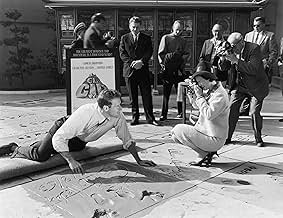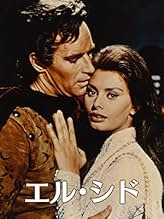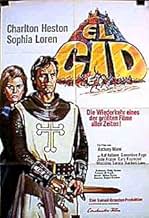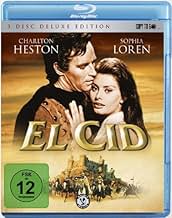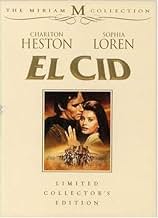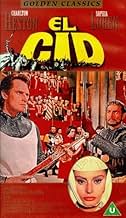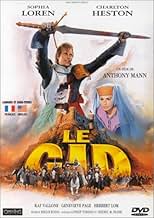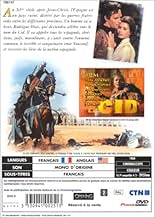"Film epico di un leggendario eroe spagnolo, Rodrigo Diaz (""El Cid"" per i suoi seguaci), che, senza compromettere il suo senso stretto dell'onore, riesce a prendere l'iniziativa e allontan... Leggi tutto"Film epico di un leggendario eroe spagnolo, Rodrigo Diaz (""El Cid"" per i suoi seguaci), che, senza compromettere il suo senso stretto dell'onore, riesce a prendere l'iniziativa e allontana i Mori dalla Spagna. Scritto da Stewart M. Clamen <clamen@cs.cmu.edu> Tradotto da Eugeni... Leggi tutto"Film epico di un leggendario eroe spagnolo, Rodrigo Diaz (""El Cid"" per i suoi seguaci), che, senza compromettere il suo senso stretto dell'onore, riesce a prendere l'iniziativa e allontana i Mori dalla Spagna. Scritto da Stewart M. Clamen <clamen@cs.cmu.edu> Tradotto da Eugenio45"
- Regia
- Sceneggiatura
- Star
- Candidato a 3 Oscar
- 7 vittorie e 13 candidature totali
- Princess Urraca
- (as Genevieve Page)
- King Ramírez
- (as Gerard Tichy)
Recensioni in evidenza
Vigorously brave and compassionate, the noble Rodrigo hates bloodshed and vows to see his country at peace, frees the prisoners on their solemn pledge never again to attack Castile
For this act of courage and mercy, one of the Emirs, Moutamin, calls Rodrigo "El Cid," and pledges eternal friendship to the Cid of Vivar And so, in freeing the Moors, Rodrigo, accidentally, stumbled onto a battle, not to his luscious bride, but to a battle that will change his whole life
In the court of King Ferdinand, Rodrigo's act of clemency is misinterpreted, and he's accused of treason by his rival Don Ordonez for refusing to turn over to him the captures Moors
Unfortunately, Rodrigo's aged father, Don Diego, is slapped by the Champion of the king, Count Gormaz, father of his beloved Chimene Rodrigo begs Gormaz an apology; it is refused A duel begins and the champion is badly wounded Before he dies, however, he asks Chimene to avenge his death
Chimene's wish is fulfilled when King Ramiro of Aragon challenges King Ferdinand for the possession of the city of Calahorra by the outcome of a single combat El Cid convinces the king to permit him to fight Don Martin Thus, according to the custom of trial by combat, God would judge Rodrigo's guilt or innocence
"El Cid" is an intense film, lavish and spectacular, bigger than any in terms of cast and impressive as any in visual terms Miklós Rózsa gave a new dimension to the emotion that Anthony Mann was trying to express
Mann gives us a human story with a love story balanced with the most strongly image of a hero the world has ever seen He presented a man of honor who thinks always of his wife, his country, and his king first Even in death, his thoughts are for others and not himself
El Cid insults kings and noblemen in the name of justice and integrity and does what he knows to be right He battles the king's living sword in respect of his father He accepts the challenge of a champion of a king to prove himself innocent of treason and other things He shows a prince how any man can kill and only a king can give life He fights 13 knights, at the same time, to free a prisoner Yet he is in addition to all of this an extremely principled leader He accepts exile for life from the country he loves, and yet he is the only man in Spain who 'could humble a king and would give a leper to drink from his own pouch '
The joust sequence called "The fight for Calahorra," is perhaps the most rousing, exciting, one-to-one combat ever filmed The battle scenes at Valencia are taken on an epic scale But the value of Anthony Mann's movie is the characterization in which Charlton Heston played El Cid's life For this reason alone, the film is of greater value than most any other motion picture experience
So is the epic sweep of the tale and the intimate love story that begins when he is on his way to wed SOPHIA LOREN and finds himself asked to assume the mantle of leadership against the Moors in 11th century Spain. He makes the journey from peace-broker accused of treason to the King's fighting champion and later from exiled hero to legendary martyr.
Aside from the brilliant cinematography, authentic looking locales and colorful costumes, Miklos Rozsa's score adds a great deal to the intensely dramatic intimate scenes as well as the epic battles, all the while suggesting some Spanish motifs amidst the heraldic fanfares and love theme.
CHARLTON HESTON makes an impressive figure of El Cid, especially good in the final moments as the wounded leader who knows what he must ask his wife to do so that his followers do not lose heart after his death. RAF VALLONE as Count Ordonez, GENEVIEVE PAGE as Princess Urraca, JOHN FRASER as Prince Alfonso and GARY RAYMOND as Prince Sancho are all remarkable effective in strong supporting roles. In lesser roles, HURD HATFIELD and FRANK THRING bring their own brand of authority to minor parts.
Anthony Mann and his assistant directors have done an outstanding job on all of the battle scenes and he never falters in telling the tale in strong dramatic terms. There's an intensity in the scenes between Loren and Heston after he has been forced to kill her father for humiliating his own father in front of the court. Whatever friction there was between Heston and Loren on the set, works for them here because her animosity toward him is a chilling thing to watch.
The DVD has been wonderfully mastered and all of the Miklos Rozsa score sounds better than ever with Overture, Intermission and Exit music reminding us all what a treasure he was as a film composer.
I think the best thing I can say about this film is that even though it's nearly three hours long, I never once look at the clock. It's a thoroughly engaging picture that boasts all the great hallmarks of a sweeping historical epic. The colour, the costumes, the scope, and the attention to detail from director Anthony Mann are first rate, and par for the course is the suitably rousing score from Miklos Rozsa. Big square jawed bronzed beefcake Charlton Heston takes the lead role as Diaz, and firmly cements himself as the go to guy for gargantuan epics. Support comes in the form of Sophia Loren, Genevieve Page, Raf Vallone, John Fraser (excellent), and Gary Raymond (also excellent).
The story is an excellent one because Diaz was such a fine character from the annals of Spanish history, uniting the sulking Christian kings of Spain whilst simultaneously lifting the people of the streets off their knees and getting them to believe in the cause. However, it has to be said that this is far from the perfect historical epic movie, even allowing for the usual Hollywoodisation of facts, one can't quite get past the fact that El Cid comes across as a glamorised glory tale without any hindrances. Surely here in the 11th century El Cid's path would have been fraught and sodden with a great deal more death and destruction? There's a tameness where there should be serrated edges to the story and it takes away greatly from the film's end because the build up of Cid's heroism actually didn't contain a great deal of hard work - it was a stroll in the park so to speak.
Still, it's a wonderful film that ticks all the boxes for genre staples, and as churlish as I may be as regards the assumptive nature of El Cid's story being told here, I'm still the first to start cheering and thumping my chest as the credits role, and not even Sophia Loren's pout can distract me from the bravado warmth washing over me. 8/10
Lo sapevi?
- QuizAccording to the legend of El Cid, in his youth Rodrigo came across a leper sinking in quicksand crying for help, but none of the bystanders dared touch him. Rodrigo pulled him from the bog, clothed him in his cloak, housed him in a barn, and went to get him some food. When he returned, he found the leper had transformed into an angelic figure that identified himself as St. Lazarus. He said "For your bravery and kindness, you will enjoy success as a warrior. You will win battles upon battles and never know defeat." In a nice nod to the legend, this movie contains a scene wherein the banished Rodrigo encounters a thirsty leper who begs a drink. After unhesitatingly offering his own pouch, the Leper thanks him by name. "Who are you?" asks Rodrigo. "I am called Lazarus", the leper answers. Then he crosses Rodrigo with his staff. "May helping hands be extended to you everywhere you go, my Cid."
- BlooperAlone and on horseback, Rodrigo confronts a group of mounted guards escorting the prince to a dungeon. In response to Rodrigo's demand for the release of the prisoner, the captain of the guard laughingly says, "There are thirteen of us, and you are alone!" In the ensuing fight, Rodrigo, with some help from the prince, unhorses sixteen guards, and two remaining mounted ones flee, for a total of eighteen.
- Versioni alternative1993 reissue restores 16 minutes of "lost" footage.
- ConnessioniEdited into Wizards (1977)
- Colonne sonoreThe Falcon and the Dove
(uncredited)
Lyrics by Paul Francis Webster
Music by Miklós Rózsa
Performed by Chorus
I più visti
Dettagli
- Data di uscita
- Paesi di origine
- Lingue
- Celebre anche come
- Ель Сід
- Luoghi delle riprese
- Torrelobaton Castle, Valladolid, Castilla y León, Spagna(for Vivar, El Cid's home town)
- Aziende produttrici
- Vedi altri crediti dell’azienda su IMDbPro
Botteghino
- Budget
- 6.250.000 USD (previsto)
- Tempo di esecuzione
- 3h 2min(182 min)


